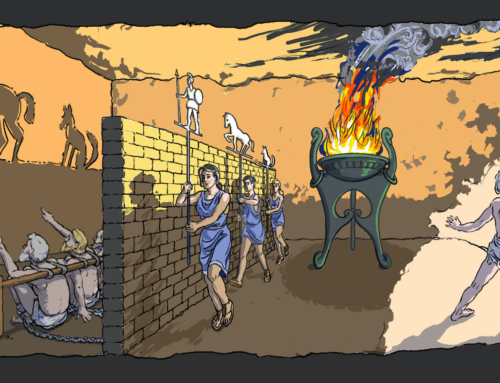A few years back, I helped to clean out my grandmother’s basement after a flood. For years, the family had been dreading the prospect of sifting through her basement’s many “hidden treasures,” but now, in one providential stroke, that task had been replaced by the far less painstaking one of filling two massive dumpsters. The things we unearthed were truly unbelievable in both volume and absurdity: three broken record players, two defunct lawn mowers, eleven old doors, fifteen sheets of plate glass, garbage bags of pharmacy-issued pill containers, an old bathtub, fifteen mixed-and-matched pairs of ice skates, and so on. It was enough to make your head spin. How could she have possibly accumulated it all?
It is on account of basements such as this that we call to mind the directive, “Simplify, simplify,” a phrase popularized by Henry David Thoreau. One often sees it, ironically, on keychains and refrigerator magnets. And it can be a very helpful mantra. When deciding whether we should keep the trinket we got at the office Secret Santa, or throw away the take-out dish that’s just the perfect shape for leftovers, or subscribe to the newsletter of a favorite online store, “Simplify, simplify” can save us a great deal of dusting, spring cleaning, and email-divesting down the road.
And yet, “Simplify, simplify” is only part of the story. At heart, it is a purely reactive principle. It presupposes that there is an inevitable drift towards accumulation and that, periodically, or even (for braver souls) continually and systematically, we ought to liberate ourselves from the effects of this “amassive gravity.” What “Simplify, simplify” doesn’t capture is the positive aspect of man’s relation to the material world.
In his First Letter to Timothy, St. Paul declares, “Every creature of God is good.” It is a hallmark of the Christian tradition to affirm the inherent goodness of the material world. St. Thomas teaches that inasmuch as something is, it is good. “Being” and “good” are, in fact, convertible terms. Good simply adds to being the notion of desirability. It follows that one need not feel guilty for having possessions. The backcountry hiker need not bemoan his attachment to his water purifier, nor the soldier second-guess his dependence on his helmet, nor the mother reconsider the necessity of her child’s car seat. Admittedly, such examples are ridiculous, but they suffice to indicate that material possessions are good. They serve man’s needs and help him to attain his end.
Yet the Christian is not content with this wholesale affirmation. Experience tells us that, within this panoply of goods, there is a hierarchy, and, furthermore, that the lower is ordered to the higher. Christian teaching is unanimous that the highest good, God, constitutes man’s ultimate destiny and that man’s contact with lower goods ought to serve his relationship to the Most High. To this end, there is a whole array of virtues whereby man lives in accord with his destiny and affirms goods in their proper order. With respect to material goods, a brief look at poverty of spirit can offer a particular and helpful insight.
The traditional Christian teaching about voluntary poverty, which can be applied analogously to poverty of spirit, is that it is not an end in itself, but rather serves the ultimate end of human striving, namely, charity. St. Thomas Aquinas, in his treatise on religious life in the Summa Theologiae, asks whether voluntary poverty is required for religious perfection. He answers by noting that, above all, “the religious state is an exercise and a school for the perfection of charity.” Perfect charity, he says, entails the absence of undue affection for created things, and, inasmuch as poverty withdraws one from such affections, it paves the way for growth in charity.
In effect, voluntary poverty frees man from inordinate attachments to created things, as well as a false sense of dependency on them. In this way, he is freed to recognize in God his ultimate sufficiency, and this recognition expresses itself in love. Poverty of spirit opens in man the space for a proper estimation of spiritual goods and enables him to order his material goods to a transcendent end.
And so, rather than weighing our possessions on the morally neutral scale of “Simplify, simplify,” we are perhaps wiser to weigh them on the scale of destiny. In doing so, we may find that the “Simplify, simplify” refrigerator magnet is one of the first things to go.
✠
Photo by Dustin Scarpitti on Unsplash







